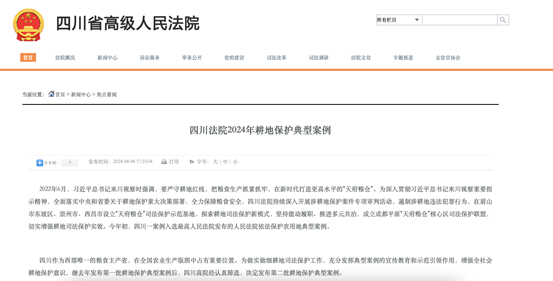Guantao Chengdu’s work selected as a typical case on cultivated land protection in 2024 by Sichuan people’s court
On August 8, 2024, Sichuan High People's Court released the second batch of typical cases on cultivated land protection, totaling 7 cases. Guantao Chengdu’s work was selected as one of them, which was led by Guantao dispute resolution partner Mr. Li Kai and assisted by Ms. Guo Guangrong to represent the Park City Construction Bureau of a certain District and the Land Reserve Center of a certain District in an administrative agreement with a Natural Gas Chemical Research Institute.
The typical significance of this case lies in that the basic principle of "those who pollute are responsible for cleaning up" is applied to land transfer to determine who shall assume the liability and solve the dilemma of "enterprises polluting, people suffering and government paying the bill".

Case No.5: A Natural Gas Chemical Research Institute v. the Park City Construction Bureau of a certain District and the Land Reserve Center of a certain District
— — Application of the principle of "those who pollute are responsible for cleaning up" to the land transfer
Basic facts
A natural gas chemical company (hereinafter referred to as "Chemical Company") is a wholly-owned subsidiary of a natural gas chemical research institute (hereinafter referred to as the "Tianhua Institute"). As the main entity for land collection and reserve of Chemical Company, the Tianhua Institute shall be responsible for handling the formalities and matters relating to land collection and reserve and processing the advance payment and compensation for land collection and reserve. On August 5, 2015, the Tianhua Institute and the Land Reserve Center of a certain District (hereinafter referred to as the "Land Reserve Center") entered into the Compensation Framework Agreement for Land Recovery. On January 21, 2016, both parties entered into the Compensation Agreement for Land Recovery, specifying the land location, area and various compensation fees totaling RMB168.1093 million. In the process of land recovery and relocation, it was found that the land in question had environmental pollution risks. As required by various administrative authorities, the Tianhua Institute entrusted Chemical Company to enter into contracts with other parties, continuously carried out soil environment investigation, assessment, treatment and restoration activities on the land in question, and paid RMB25,620,581 in total under the contracts. In June 2022, the land in question was removed from the List of Construction Land Soil Pollution Risk Control and Restoration in Sichuan Province. Both parties had disputes over the sharing of the treatment and restoration expenses, and the Tianhua Institute filed a lawsuit to demand the defendants Land Reserve Center and the Park City Construction Bureau of a certain District (hereinafter referred to as the "Park City Bureaus") to compensate them for the soil pollution treatment and restoration expenses of RMB25,620,581, interests on fund occupation, attorney fees, preservation and guarantee expenses incurred.
Results of judgment
Chengdu Intermediate People's Court held in the second instance that the Compensation Agreement for Land Recovery was legal and valid. Both parties failed to agree on the expenses relating to soil pollution treatment and restoration which will be a part of the compensation amount when concluding the agreement, nor reach an agreement on the expenses relating to the land pollution treatment in question and other relevant matters through negotiation, and there was no evidence showing that the administrative authorities had the act of exercising its preferential right and unilaterally changing the agreement because of a change in circumstances, national interests, or public interests. As a chemical company is liable for soil pollution due to the production and sale of its chemical products, it caused pollution to the soil involved in this case and had the statutory obligation to carry out soil pollution risk control and restoration. In accordance with relevant provisions of the Contract Law of the People's Republic of China effective at the conclusion of the Agreement, the delivery of the polluted land after restoration and treatment of such land by Chemical Company and Tianhua Research Institute during the performance of the Agreement shall be a statutory obligation for the performance of the Agreement. Accordingly, the court rejected the appeal and sustained the original judgment, that is, rejected all the claims of the Tianhua Institute.
Typical significance
Ecological and environmental protection is "the most important task of the country", and green is the base color of high-quality development. In this case, the Chemical Company breached the relevant provisions of the PRC Law on the Prevention and Control of Soil Pollution due to the production and sale of chemical products which caused environmental pollution in the course of its operation. According to the basic principle of "those who cause pollution shall be responsible for the treatment", the development of an enterprise shall neither be at the cost of the environment nor benefit from any act of environmental pollution; the prevention of pollution and the protection of the environment are the proper matter within the duty of an enterprise in its operation. As the company in question was directly liable for soil pollution, it shall assume statutory obligations for soil pollution risk control and restoration. This case determined the entity which shall be responsible for pollution treatment, ensuring that the entity responsible for eco-environmental pollution bear the treatment costs for ecological environment restoration, so as to solve the dilemma of "enterprises polluting, people suffering and the government paying the bill". At the same time, the trial of this case plays an active role in demonstrating the administrative authorities in strengthening the guidance and supervision to the rational use of land by enterprises and correctly performing such government duties as acceptance in the course of land transfer.